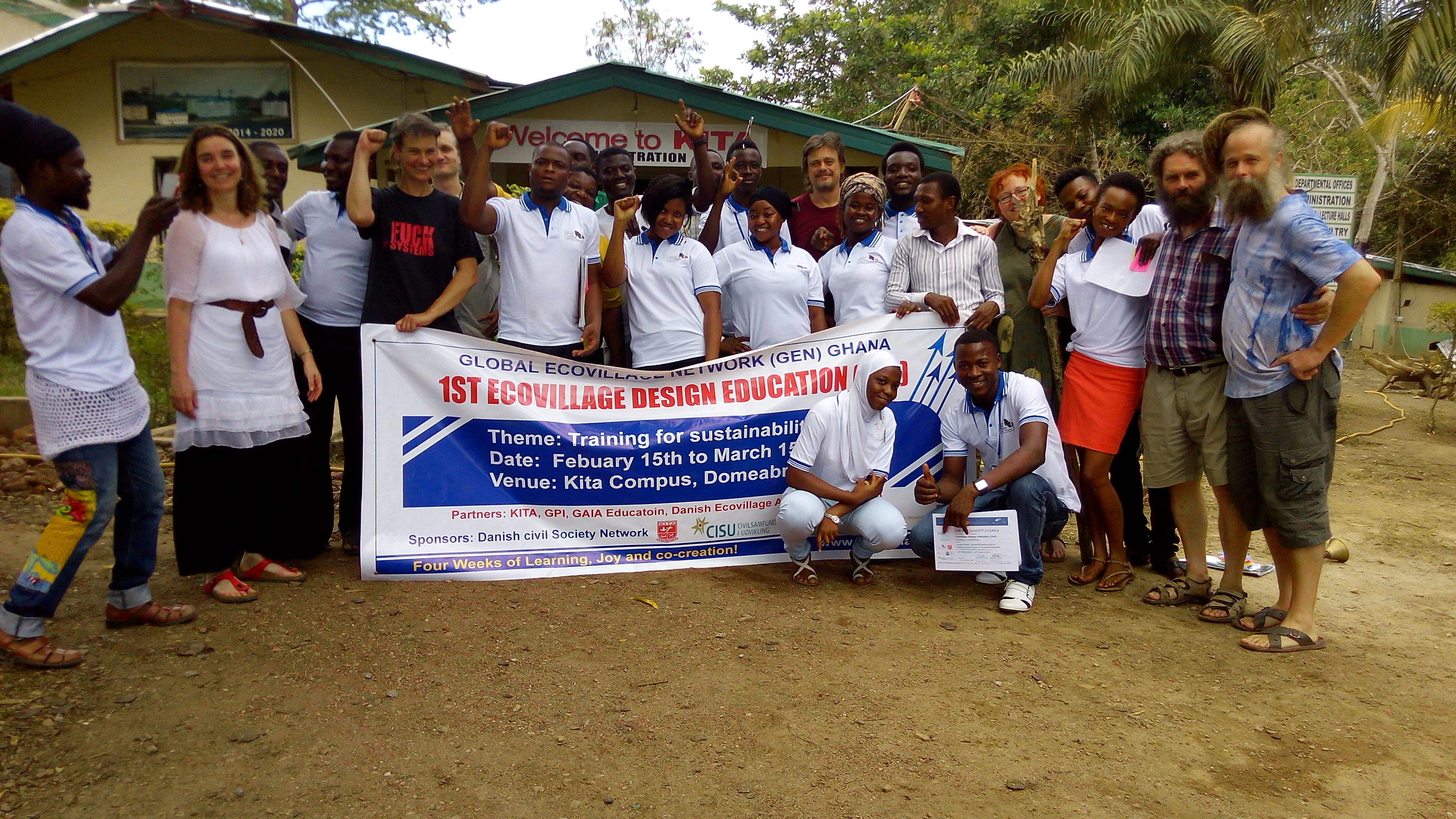The first Ecovillage Design Education (EDE) course in Ghana has been held at the Kumasi Institute of Tropical Agriculture, KITA in Kumasi. The four week international training course is aimed at building capacity of community leaders, CSOs and institutions and members of GEN Ghana in ways to enhance sustainable lifestyles and sustainable development in communities. The EDE is approved by the United Nations Education for Sustainable Development and was held from 15th February to 15th March 2016. About 35 participants were trained in the Ecovillage Design. The EDE was under the auspices of the Danish Ecovillages Network (LOES) with support from the Danish Civil Society Fund (CISU).
Lovans Owusu-Takyi, the Secretary to the Ghana Ecovillages Network (GEN Ghana) and a Programs Coordinator at Kumasi Institute of Tropical Agriculture, KITA in an interview with GNA indicated that, the Ecovillage Model is very important for our community development since it promotes approaches that ensure sustainable care for the earth, care for people, sustainable livestyles and fair share of resources. He added that our current development paradigm has been exploitative of earth resources causing destruction to our environment, bringing conflicts over scarce resources and resulting in global challenges such as climate change, deforestation, food, nutrition and energy insecurity as well as unsustainable waste management. He said the Ecovillage Design Education course is an internationally certified education program that build the capacity of community leaders to live and promote sustainable lifestyles whiles implementing ecovillage strategies for sustainable community development.
Participants were trained in the 5 dimensions of sustainability that is an integral part of the ecovillage development approach. This includes the social, cultural, economic and ecological dimensions as well as participatory design. Participants received practical social tools such as conflict resolution, project design, participatory planning, leadership skills, facilitation skills, community mobilization for action. Also ecological tools such as renewable energy, solar installation, biogas, clean cook-stoves, permaculture, organic farming, home and school gardening, fruit juice processing, fruit drying, reconnecting to nature, water harvesting and waste water treatment, water purification, among others. Participants were also empowered with economic tools for income generation including fair trade, shared economy, soap making, moringa processing, oil distillation, ethical banking practices, and social enterprise development. Participants were trained to embrace diversity, build economy, influence policy and develop their sustainable lifestyles. Through participatory design, participants prepared designs that emulates how they can transition traditional communities into ecovillages.
Participants also developed eco-strategies as entry points to community development. 8 eco-strategies were prioritized among a host during the training sessions. Participants committed to implementing food sovereignty, seed banks, bee-keeping, solar energy, Tree planting, sanitation and waste recycling, green building among others. Participants capacities were built in these strategies for which they go back to integrate into their communities to ensure clean environments as well as biodiversity conservation.
Mr Lovans Owusu-Takyi urged participants to go back home and take necessary action to develop their communities and households sustainably, advocate for the integration of eco-strategies in ensuring sustainable development, implement these strategies and live sustainable lifestyles.
Camilla Nielsen-Englyst, the Secretary General of the Danish Ecovillages Association, indicated that the ecovillage design education is a sustainable training model that must be embraced in Ghana to empower community leaders to make policies that ensures that people live sustainable livestyles and promotes community development. She said the EDE is a partnership intervention to build the capacity of members of the Ghana Ecovillages Network (GEN Ghana) to be able to advocate for ecovillage strategies into national policy making decisions in order for policy makers to develop sustainable communities.
Kosha Anja Joubert, the Executive Director of the Global Ecovillages Network, GEN International indicated that the ecovillage model is the pathway to achieving the sustainable development goals and urged the government to adopt the ecovillages model in developing Ghana. She said in Senegal for example, a ministry of Ecovillages has been established by the government to transition 14000 traditional villages into ecovillages.
Mrs Fati Bamba, a treasurer of the Ghana Ecovillages Network GEN Ghana and Youth Coordinator at the Ejisu District expressed appreciation to the Danish Ecovillages Network and CISU for supporting the capacity building of GEN Ghana. She said the training has been transformational and participants are going back to their communities with a lot of energy and motivation to implement eco-strategies to ensure sustainable development.
Charles Katere a participant in the Ecovillage Design Education from the Ghana Permaculture Institute in an interview with GNA said, the EDE has been very beneficial to me for life and will help me to live a sustainable lifestyle whiles empowering communities in the northern region to be self sustaining. He indicated that anyone who gets the chance to participate in the Ecovillage Design Education Course should not hesitate since it is an important course for community leaders today
